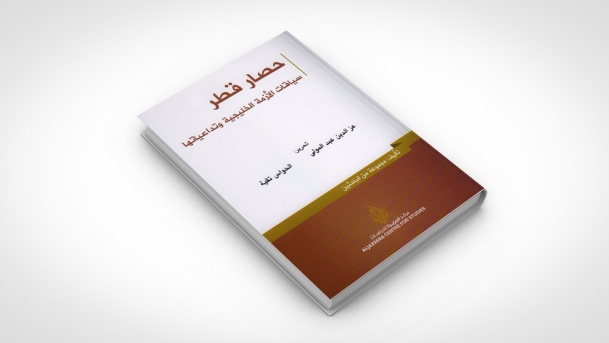
Al Jazeera Centre for Studies (AJCS) has published a book entitled, The Blockade of Qatar: The Contexts and Repercussions of the Gulf Crisis, about the recent crisis that broke out on 5 June 2017 following the declaration of Saudi Arabia, the United Arab Emirates, Bahrain and Egypt of a land, sea and air blockade on Qatar, analysing its dimensions and impacts on the Gulf Cooperation Council (GCC) as well as the status quo and future of the. A collective work of specialised researchers and academics, the book also examines the positions of active regional forces like Turkey and Iran, or even Arab, African and European states. The manner in which this crisis is being managed by all the parties involved, including Kuwait, constitutes a fundamental aspect of the book.
Limited to the first three-month period of the crisis, the research investigates the reasons behind the blockade based on the stances falsely attributed to the Emir of Qatar, Sheikh Tamim bin Hamad Al Thani, on Qatar News Agency website, whose hacking was later found to be the doing of some of the states imposing the blockade. The first chapter of the book puts the blockade in a timeline, tracking the steps taken by Saudi Arabia, the United Arab Emirates, Bahrain and Egypt on 5 June 2017, starting with the severing of diplomatic relations with Doha. The book raises a question about whether the crisis will be a brief one with regards to relations between the Gulf states, or a long term severance. In Chapter 2, the book delves into the roles of the key players in the crisis and enquires into their agendas, beginning with the troubled relations between Saudi Arabia and its neighbours, as the current crisis is not the first clash between the kingdom and its smaller neighbours. It discusses the fundamentals of Saudi foreign policy that contribute to the kingdom’spositions on these states, and the reasons why conflict is a recurring and prolonged obstacle to Saudi-Gulf relations in general. The book also explores the power shifts and the variation of the roles in UAE’s policy towards its region and beyond during the 1980s and the last decade when Emirati policy toward many issues began to shift.
In Chapter 3, the book reviews the regional and international reactions to the crisis including Kuwait’s mediation efforts, and the motives prompting Kuwait to play the role of mediator in regional conflicts in general, and the current Gulf crisis in particular; and it surveys the likelihood of success of the said mediation. The book also discusses Turkish political action and shows the obstacles therein, as Turkey was among the most important regional powers involved in the blockade since its beginning. In addition, it addresses Iran’s position towards the crisis; despite the significant changes in Iran’s interpretations of what is happening in its vicinity, what really brings these interpretations together is that Gulf unity has become of a thing of the past, and that Iran must capitalise on these developments strategically. African positions towards the crisis, however, varied in the Horn of Africa as well as in sub-Saharan Africa, and the book examines possible political and economic impacts of the crisis on the countries of those regions according to their respective positions towards the blockade. The positions of Arab countries have also varied, but most of them have been neutral and supported Kuwait’s mediation efforts; Morocco’s position is an example of this neutrality, urging the parties in the crisis to sit at the negotiating table. Aside from the Arab and African contexts, the book reveals European policy towards the Gulf crisis and assesses the variation in the positions of the member states of the European Union in approaching its complications. Moreover, it reviews the challenges facing European countries in their position on the crisis given the weak political consistency among them and the discrepancy in their views of the strategic alliances that should be established in the Middle East.
In Chapter 4, the book discusses the consequences of the blockade and the crisis, and highlights the calculations of the blockading states and their misinterpretation of regional and international positions, as well as the causes behind the obstacles to and failure of their policy toward the blockade and the frustration of its patrons in achieving their goals. The book also addresses the effects of the Gulf crisis on the future of the GCC; despite the time required to resolve this crisis, what has happened affects not only Qatar but also the structure and role of the council. The crisis, unlike its precursors, has gone beyond the Gulf scope and its effects have rapidly spilled over the rest of the Middle East.
Title: The Blockade of Qatar: The Contexts and Repercussions of the Gulf Crisis
Author: A group of researchers
Edited by: Ezzeddine Abdelmoula and Haoues Taguia
Publisher: Al Jazeera Centre for Studies - Arab Scientific Publishers
Year: 2017